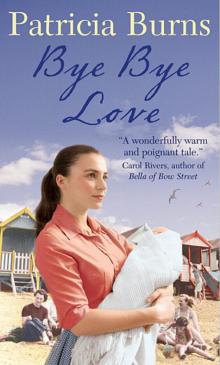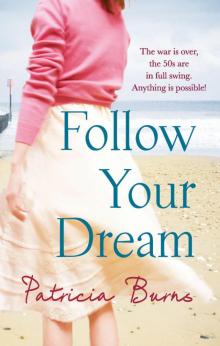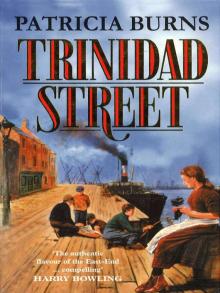- Home
- Patricia Burns
We'll Meet Again Page 10
We'll Meet Again Read online
Page 10
‘But lots of women manage to look after babies all right,’ Tom argued. ‘The colliers’ wives are for ever having babies. My mam’s always on about it, how they keep on having them—’ He paused as he remembered that the bigger girls seemed to do a lot of looking after the babies and toddlers. ‘And it’ll only be one little baby. That can’t make much work, surely?’
‘I can’t leave her. She’s not strong, and my father …’
Her father.
‘He wouldn’t—you know—not when she’s having a baby?’ he asked.
‘I don’t know. I hope it’s a boy. He wants a boy, to take over the farm. He always holds it against me that I’m a girl. If it’s a boy, he might be nicer,’ Annie said.
It was hopeless, he could see that. It was duty. He had been brought up on duty. Duty to your parents, and to God, and the King and all the rest of it. It was his duty to go into the family firm rather than become an artist. He was going to use duty to his country to reason with his parents when he told them that he was going to join up.
It was getting dark inside the chalet.
‘I’ve got to go,’ Annie said. Her voice was rough with unshed tears.
‘I’ve got something for you,’ Tom said.
He handed her a large manila envelope. She brightened up a little.
‘A present? For me? What is it?’
‘Have a look.’
Annie opened the envelope and drew out a sheet of paper. It was a water-colour of Silver Sands, with part of the wild garden around it and the two of them sitting on the veranda steps. It was the best of the several attempts he had made at painting the chalet.
‘Oh …’ Annie breathed. ‘Oh, Tom, it’s lovely, it’s the nicest thing anyone’s ever given me. Look—that’s us, on the steps! I’m in a painting! Thank you so much, I’ll treasure it for ever.’
She sat studying it for a long time while Tom watched, aching with pleasure that he had managed to please her. Then she put the painting carefully back in the envelope and stood up.
‘I really have got to go.’
He couldn’t bear to see her like that, so small and forlorn. He almost blurted out a promise not to join the RAF. Anything, to see her just a little less unhappy.
Instead, he put his arms round her. He felt her slight body against his, her arms gripping him fiercely.
‘I’m going to miss you something terrible,’ he heard himself say.
‘Me too.’
He touched her hair and she looked up at him. Her eyes were swimming with tears. As naturally as breathing, he lowered his head and their lips met. Her mouth was on his, sweet and soft and intoxicating. For a timeless space, they kissed and kissed again, and then pulled apart, breathless. They looked into each other’s eyes, both bemused by the wonder of it.
Then a sob broke from Annie’s throat and she tore away, across the room, out of the door and down the steps. Tom ran after her, but he knew it was no use. He stood on the veranda and watched as she ran off across the fields in the gathering twilight, the brown envelope still clutched tightly in her hand.
CHAPTER ELEVEN
ANNIE knew something was wrong the moment she stepped into the back porch. Though the wireless could be heard, there was an ominous quiet about the place. Foreboding wormed through her. She opened the back door. The kitchen was empty, which in itself was odd. Her parents always sat in there, every evening.
‘That you, girl?’
It was her father’s voice, from the hallway. Fear catching at her throat, Annie hurried through to find her mother sprawled unmoving at the bottom of the stairs, her eyes shut. Her father was kneeling beside her.
Annie stared at her, horrified.
‘What—?’ she began, then stopped. It was obvious what had happened. Hard on the heels of fear came guilt. If she had not gone out, it might not have happened.
Her father looked up at her, his face set in its usual grim expression.
‘Get on that bike of your’n and fetch the doctor,’ he ordered.
‘The doctor!’
The doctor was never sent for, except in cases of dire emergency. The doctor cost money.
‘What have you—Is she—?’ Annie faltered.
She peered at her mother’s face in the half light. She was deathly pale, but she was still breathing. Then she saw the blood and cried out in horror.
‘Oh, my God! What’s happened? Where’s she hurt? Mum, Mum—’
She dropped to her knees beside her mother and took her limp hand in hers. Beneath skin worn rough and callused from years of scrubbing, it felt so fragile.
‘She’s miscarrying,’ her father said. And there was more than his usual harshness in his voice. There was a real urgency. ‘Tell the doctor that. Tell him she fell. Go on! What are you waiting for? Useless girl. Run!’
Annie ran. Whimpering with fear for her mother, she grabbed the bike and jumped on it, then pedalled for all she was worth. Her father had really done it this time. What if her mother were to …? She couldn’t face the thought, shying away from it. That couldn’t happen, it just couldn’t. Down the track she went, with just a passing glance across the fields to where Silver Sands crouched, dark under the sea wall. To think that while she had been there with Tom, all this had been going on at home. If only she had come back sooner—or not gone at all. She might have been able to stop it. Her mother would be all right at this very moment, instead of lying so still on the floor, bleeding … Along the Wittlesham road she went in the half light with her legs aching, her lungs burning. A miscarriage. Sometimes the cows miscarried. They generally survived, but then they hadn’t been knocked unconscious.
Never had the Wittlesham road seemed so long. After what felt like an age, she came to the outskirts of the town. Please, God, she prayed, please let her be all right. Please. She pedalled up the tree-lined street where the doctor lived and into the driveway of the bay-windowed house. Flinging the bike down on the front lawn, she rang frantically at the bell. When it wasn’t answered immediately she banged the knocker. The door opened.
‘All right, there’s no need to rouse the whole neighbourhood. What’s the matter?’ The doctor’s wife was staring at her with cool disapproval.
‘It’s—my mum—’
Annie could hardly speak. Her chest was heaving.
‘It’s all right, I’m coming.’
Dr Scott stepped round his wife. He was large and authoritative and already had his bag in his hand. He reached out and held Annie’s shoulder with a reassuring grasp, looking into her eyes.
‘Where are we going, young lady?’
Annie made a huge effort to control her breathing enough to speak.
‘Mar—sh—Edge—Farm.’
She was aware of the relief of having part of the weight of responsibility lifted off her shoulders.
Events blurred. She was hustled into the front seat of a big black car. As they drove through the gathering dark, the doctor asked her about what had happened. Annie answered as best she could. Part of her registered that here she was, riding in a motor car for the first time in her life, but she could take no pleasure in it. She stared through the front window, leaning forward in the seat as if to encourage the thing to go faster. The doctor was saying reassuring things, but Annie couldn’t accept them. He hadn’t seen her mother’s face, or the blood.
As they entered the back door, a groan of pain met them.
‘Mum!’ Annie cried and flew through the kitchen to the hall.
Her mother was no longer at the foot of the stairs. Another groan sounded. It was coming from above.
Dr Scott was right behind her.
‘Good God, he’s not gone and moved her, has he?’ he muttered. ‘These people!’
Annie ran ahead to the first floor. The sound was coming not from her parents’ bedroom, but from the spare room next to it. Annie pushed open the door. Her mother was huddled on the unmade-up bed, her face sweating in the yellow light of an oil lamp. A blanket had been thrown over her an
d she was alone. Walter was nowhere to be seen. Annie flung herself on her knees on the bare boards beside her and cradled her hand in both of hers.
‘Mum, Mum! It’s all right, the doctor’s here—’
‘Doctor?’ Her mother’s voice was a thin rasp. ‘No, no, not the doctor, I don’t want—’
‘Now, then, Mrs Cross, let’s have a look at the problem, shall we?’ Dr Scott cut in.
He took off his jacket and handed it Annie.
‘How old are you, young lady?’
‘Fifteen,’ Annie said, puzzled.
He nodded. ‘Old enough, and you look like a sensible girl. Helped with calvings, have you?’
‘Y-yes—’
‘Then you can act as my nurse. Go and fetch some old clean sheets and a large bowl of water and some disinfectant, if you have any.’
Glad to be doing something useful, Annie ran to obey. As she ran water into a tin bowl in the kitchen, her father came in from the yard.
‘He here?’ he asked.
‘Yes,’ Annie said. She did not even think of pointing out that he must have heard the motor car come into the yard.
Walter grunted. ‘You making the cocoa?’ he asked.
Something snapped inside Annie.
‘Cocoa! You make your own cocoa. I’m helping the doctor,’ she told him.
Half expecting to feel a hand smash into her head, she picked up the bowl and stalked out of the room.
Walter said nothing. Five minutes later he appeared at the door of the spare room. Annie looked up from easing a pillow under her mother’s head. To her amazement she saw that there was something close to real anxiety in his weathered face.
‘She going to be all right?’ he asked.
Dr Scott was frowning over his examination of Edna’s bruises.
‘She’s concussed. That doesn’t help matters. What happened here, precisely?’
‘She fell. Down the stairs,’ Walter said.
‘I see.’ The doctor’s voice was carefully neutral. ‘Well, Mr Cross, I’m not going to be able to save the baby. It’s far too late for that. As for your wife, I’m not sure yet what effect the—er—fall will have on her.’
Annie gasped. He knew. The doctor knew what had happened even though she had told him that her mother had fallen. She watched open-mouthed as her father thought this one through.
‘You do all you can for her,’ he ordered.
‘That’s what I’m here for, Mr Cross.’
‘You mind you do.’
Edna moaned as another pain gripped her. Annie clasped her hand. Dr Scott put a hand on her shoulder.
‘Don’t fight it, Mrs Cross. You’re going to be fine,’ he assured her. Then, as the pain retreated, he asked, ‘So what brought all this on, then?’
‘I fell,’ Edna whispered.
‘You fell? Right down the stairs?’
‘Clumsy. Always—so clumsy—’
Dr Scott sighed. ‘If you say so, Mrs Cross.’
Annie looked across the bed at him. He understood. Here at last was an ally. Hope surged through her.
‘She didn’t fall. I’m sure she didn’t. It was—’ she began.
Doctor Scott held her eyes. ‘It’s what she wants to believe,’ he said.
Hope died as quickly as it had been born. He wasn’t going to help them. They were still trapped, she and her mother. There was no way out.
She helped the doctor undress her mother and get her into an old nightdress and make her as comfortable as possible, while Edna looked horribly embarrassed and kept apologising for all the trouble she was causing.
For the next two hours, Edna drifted in and out of consciousness as the labour pains got closer together. Distressed and afraid, she clutched at Annie’s hand, while Annie, just as frightened, tried to soothe and reassure her. She found she was saying things that her mother used to say to her when she was a little girl and had hurt herself. It was as if she were the grown-up and her mother the child. The responsibility of it was terrifying.
‘The baby’s coming, isn’t it?’ she gasped. ‘I don’t want it to … it’s too early … too early … it’ll die … I don’t want it to die …’
‘It’s all right, Mum,’ Annie said. ‘The doctor’s doing all he can—’
‘Doctor? You won’t let him take me away?’
‘No, no, of course not. He’s here to help you.’
In the quieter moments, the doctor questioned Annie. Had there been any other miscarriages that she knew of?
Annie thought about it.
‘Not like this,’ she said. ‘But, there have been times when she was ill and she said she had women’s troubles—I don’t know—’
Her mother didn’t discuss that sort of thing.
‘I see. No other babies, then? You’re the only child?’
‘There was another baby …’
Annie shivered as she remembered the time when she’d been quite small. She had woken in the night to the sound of adult activity and a strange woman’s voice. When she’d crept out of bed to see what was happening, a big woman was bending over her parents’ bed and her mother was crying out, the same way that she was now. The big woman—the midwife, she now knew—had ordered her back to bed, but Annie hadn’t been able to sleep. The sounds coming from her parents’ room had been too frightening. As soon as it was light, she’d got up again and slid across the landing. She had been just in time to see the woman put a small cloth-wrapped thing in a bag.
‘Best you don’t see it, dearie,’ she was saying to Edna. ‘You’ll get over it quicker that way. There’ll be others, you’ll see.’
And then her mother’s voice, barely recognisable. ‘What was it? A girl or—?’
‘A boy,’ the woman said. ‘Pity. A girl would have had a better chance. They’re tougher, baby girls.’
‘A boy? It was a boy? Oh, no—’ Her mother dissolved into agonised sobs.
‘My mum wasn’t herself for a long time after that,’ Annie told the doctor.
In fact she had never really been the same since. The woman who’d used to sing as she’d gone about her tasks had disappeared. Only occasionally did flashes of the old Edna surface, usually when Walter was away from the farm for some reason. Then they would rush through the chores and make time for a little treat together, a cup of tea and a special cake, perhaps, or the planning of a new item of clothing. Then her mother would laugh and chatter, the tense lines in her face would soften and she would open up, talking about things that she used to do in her family home. But generally she was quiet and subdued, holding everything inside herself, appearing to think of nothing but getting the chores done and keeping on the right side of her husband.
‘I see,’ the doctor said again. ‘And she never sought any treatment? She didn’t see my predecessor at the surgery?’
Annie couldn’t recall her ever going.
‘I don’t think so. Mum’s frightened of doctors.’
Dr Scott shook his head. ‘If only people would come to me before things got serious, I might be able to do more to help.’
Some time in the early hours of the morning, the pains got closer together. Edna thrashed her head from side to side on the pillow, her mouth set in a grimace of pain. Groans and cries tore from her throat. Terrified, Annie could only hold her as she gripped her hand. Was her father listening to this? He had to be. It was his fault. He had done this.
‘Won’t be long now,’ the doctor said, folding the sheet back over her mother’s belly. Edna’s bruised legs were exposed, bare and white, spread with her knees raised. ‘Come along now, Mrs Cross, a good big push … That’s it, keep it up—it’ll soon be over—’
Her mother gave a long grunting animal sound. With a rush, something red and fleshy and slimy appeared on the pile of sheets between her legs. Annie just had time to make out a tiny bulbous head and a minute arm amongst the mess before the doctor snipped something with his scissors, wrapped the thing in some of the sheeting and dropped it into the enamel bucket th
at Annie had brought up for him. Droplets of blood splattered over his white shirt-front.
‘That’s it, well done, Mrs Cross. Just the afterbirth now and we’re done.’
Her mother was struggling to raise herself on her elbows.
‘My baby—what was it?’
The doctor gripped her knee.
‘Now then, Mrs Cross. The worst is over now. Soon you can have a good rest.’
‘But my baby—’
Another shudder of pain went through her and more disgusting mess appeared on the bed. Again the doctor dealt with it swiftly, dumping the bundle in the bucket on top of the other one.
‘That’s it. Now, let’s get you comfortable,’ he said.
Edna reached out and clutched at his arm. Annie could see him wince under the fanatic strength of her fingers.
‘Tell me. You must tell me—my baby—what was it?’
Dr Scott looked at her and for a moment his professional mask slipped.
‘A boy, Mrs Cross,’ he told her gently.
Her mother said nothing. She collapsed back on the pillow with a look of utter defeat on her face. Silent tears ran down into her wild hair.
Annie stared at her, and as she did, the full meaning of what had happened finally got through to her. It wasn’t just a fall or an injury, or something terrible that her mother had suffered. The thing in the bucket was her baby brother. A human being.
Annie jumped up and ran out of the room and down the stairs into the kitchen. She leaned over the sink and retched until there was nothing left in her stomach. Then she washed her hands, splashed her face with water and, with trembling legs, walked slowly up the stairs again to face whatever came next.
CHAPTER TWELVE
‘COME on then, Tom lad, your mam’ll have tea waiting.’
‘What?’
Tom came back to the present, feeling totally disorientated. In his head, he had been sitting on the settee at Silver Sands with Annie. Her warm hand was folded in his. It was a shock to find himself leaning over the engine of a coach with a spanner in his hand. His father was looking over his shoulder.
‘Home time, lad. You finished that yet? It’s not a major job.’

 Packards
Packards Bye Bye Love
Bye Bye Love Follow Your Dream
Follow Your Dream Trinidad Street
Trinidad Street We'll Meet Again
We'll Meet Again